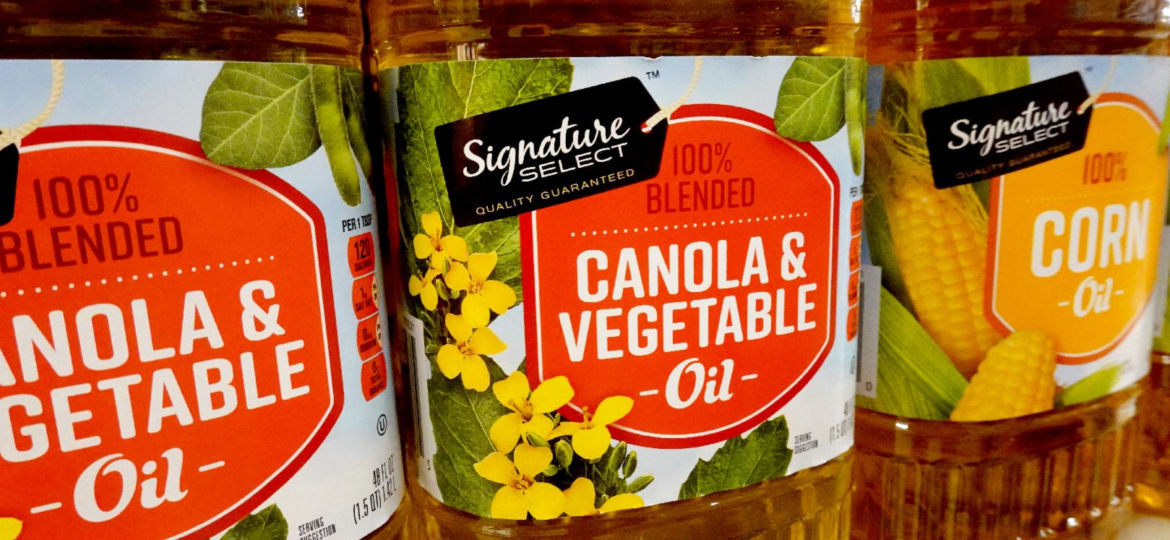
Blogs and social media posts claim many vegetable oils, such as those made from sunflower and canola, can promote inflammation that leads to heart disease and other ailments. This is misleading; health experts say consumption of seed oils can be beneficial if not included in highly processed foods.
“The consumption of vegetable oils (seed oils) has jumped along with the rates of chronic illness, infertility & obesity,” says a November 30, 2022 Instagram post.
In an Instagram video published November 25, a narrator says: “These vegetable oils, also called seed oils, they get stuck in your cell membranes in body fat for two to five years.” Similar claims were made on TikTok.
The post references comments from physician Cate Shanahan, whose 2020 blog post has been shared as evidence of the harm caused by what she termed the “hateful eight” oils: canola, corn, cottonseed, soy, sunflower, safflower, grapeseed and rice bran.
 Screenshot from Instagram taken December 15, 2022
Screenshot from Instagram taken December 15, 2022 Screenshot from Instagram taken December 15, 2022
Screenshot from Instagram taken December 15, 2022Some posts have linked seed oils to an array of diseases and ailments, including cancer, diabetes, asthma and arthritis. Others recommend replacing these with animal fats or other plant oils.
Medical experts say all fats are high in calories and should be consumed in moderation, but claims that vegetable and seed oils are harmful are misleading.
Canola differs from rapeseed oil
Many of the claims circulating online single out canola oil but misrepresent its properties and how it is produced.
“Although care must be taken in handling and processing of canola oil and other vegetable oils, canola oil is a safe and healthy form of fat that will reduce blood LDL cholesterol levels and heart disease risk compared to carbohydrates or saturated fats such as found in beef tallow or butter,” said Guy Crosby, an adjunct associate professor of nutrition at Harvard University, in a 2015 blog post.
Some posts erroneously claim canola oil is the same as rapeseed oil, which is used in industrial applications.
Canola is a variety of rapeseed developed in Canada with lower levels of erucic acid, which can be toxic to humans. The US Food and Drug Administration (FDA) told AFP in an emailed statement that it approved the use of canola oil, which is extracted from the seeds of the canola plant, in 1985.
“Prior to the 1960s, rapeseed oil had a relatively high amount of the substance erucic acid. Based on animal feeding studies, safety concerns were identified,” the agency said.
“In the 1960s, using traditional plant breeding techniques, scientists developed new varieties of rapeseed with lower levels of erucic acid. Oil from these new varieties was called ‘canola oil’ to differentiate it from oil with higher levels of erucic acid.”
In 2018, the FDA allowed the manufacturers of canola, sunflower and olive oil to make the “qualified health claim” that “consuming oleic acid in edible oils … may reduce the risk of coronary heart disease.”
Seed oil risks exaggerated
Health experts say most commercially available seed oils can be beneficial if they are not consumed as part of highly processed packaged foods and snacks.
A 2009 study in the journal Circulation found that people who consumed between five to 10 percent of their caloric intake from polyunsaturated fatty acids — the main element of seed oils — had a lower risk of cardiovascular disease.
Dariush Mozaffarian, a professor of medicine and researcher at the Tufts University Friedman School of Nutrition Science and Policy, said the oils cited in the social media posts come from seeds, nuts and beans, which are “some of the healthiest foods on the planet.”
Mozaffarian said research shows that “when humans eat these oils, their risk factors get better, they have fewer heart attacks, they have less weight gain, they are healthier” than those who use other kinds of cooking fats. He added that while industrial processing destroys some of the beneficial properties of seed oils, “that doesn’t mean they’re unhealthy.”
“It means they would be healthier otherwise,” Mozaffarian said.
In his 2015 blog post, Harvard’s Crosby dismissed concerns about harmful trace elements such as hexane, which can be introduced to canola oil during processing.
“There appears to be very little reason for concern about the trace levels of hexane in canola oil,” Crosby said.
Concerns about vegetable oils have proliferated also because of the use of hydrogenated oils and trans fats, which have become less common in the US due to their harmful effects on heart health. Crosby said virtually all vegetable oils have small quantities of trans fat due to processing, but it poses little risk.
“Of potentially greater concern is the formation of oxidation products of polyunsaturated fatty acids during prolonged commercial deep-fat frying,” he noted in his blog post. “But this is less of a concern for canola oil than for oils with higher levels of more readily oxidized polyunsaturated fat such corn, soybean, sunflower, and safflower oils.”
The FDA said its evaluation of scientific research indicates that, when consumed in moderation, plant oils pose little risk to health.
Such fats are “a core element of dietary patterns associated with positive health outcomes, as they provide essential fatty acids and are good sources of unsaturated fatty acids,” the agency said in a December 14, 2022 email.
AFP previously fact-checked a false claim about canola oil used in meat substitutes here.

